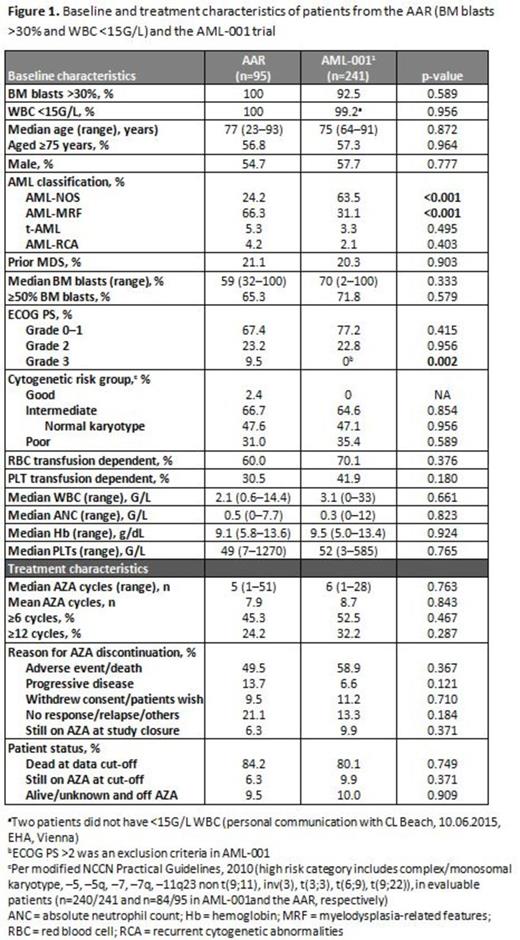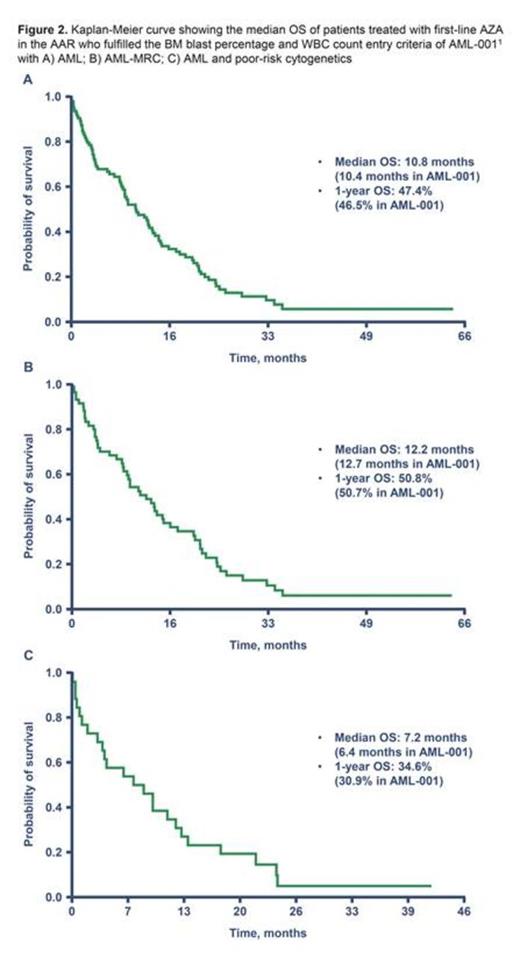Abstract
Background
In the Phase III trial (AML-001; NCT01074047) that assessed azacitidine (AZA) vs conventional care regimens (CCR; intensive chemotherapy, low-dose cytarabine or best supportive care as preselected by the treating physician) in older patients (≥65 years) with newly diagnosed acute myeloid leukemia (AML) and >30% bone marrow (BM) blasts, AZA was associated with a clinically meaningful improvement in overall survival (OS) vs CCR.1Patient registry data, if performed with adequate quality control, can complement and be of additional value to data generated in clinical trials. The Austrian Azacitidine Registry (AAR; NCT01595295) was initiated to gain a comprehensive view of the use, safety and efficacy of AZA in patients with AML in a 'real world' clinical practice setting.2,3 No formal exclusion criteria existed, as the aim was to include all AML patients treated with AZA, irrespective of age, comorbidities, and/or previous lines of treatment.2,3
Aims and methods
The aim of this analysis was to assess the efficacy and safety of 1st -line AZA in patients with AML who were included in the AAR and who fulfilled the BM blast percentage and white blood cell (WBC) count entry criteria of the AML-001 trial (BM blasts >30% and WBC <15G/L). Outcomes of the subgroups of patients with poor-risk cytogenetics and with AML and myelodysplasia-related changes (AML-MRC) who received 1st -line AZA were also evaluated.
Results
A total of 95 patients were identified that fulfilled the BM blast percentage and WBC count entry criteria of the AML-001 trial (data cut-off June 19 2015). Apart from a higher proportion of AML-MRC and a lower proportion of AML-not otherwise specified (AML-NOS) within the AAR, baseline characteristics were comparable to those observed in AML-001 (i.e. age, BM blast percentage, gender, therapy-related AML, prior myelodysplastic syndrome (MDS), Eastern Cooperative Oncology Group Performance Status (ECOG PS), cytogenetic risk, transfusion dependence, hemoglobin level, WBC count, absolute neutrophil count, and platelet (PLT) count; Figure 1). Patient status at data cut-off, reasons for AZA discontinuation and treatment characteristics were also similar: median number of AZA cycles was 5 (1-51) and 6 (1-28) for the AAR and AML-001 trial, respectively (Figure 1). Patient outcome in terms of overall response according to International Working Group criteria4 (31.5 vs 29.0%), red blood cell (42.1 vs 38.5%) and PLT transfusion independence (34.5 vs 40.6%) did not differ significantly between the AAR and the AML-001 trial. Furthermore, median OS was highly concordant between the AAR and AML-001 overall (10.8 vs 10.4 months; Figure 2A) as well as for various patient subgroups: 12.2 vs 12.7 months for patients with AML-MRC (Figure 2B); 14.6 vs 14.1 months for patients with normal cytogenetics; 13.1 vs 13.0 months for patients with intermediate-risk cytogenetics; and 7.2 vs 6.4 months for patients with high-risk cytogenetics (Figure 2C). After 1 year, 47.4% of patients were still alive in the AAR cohort compared with 46.5% in the AML-001 trial (p=0.924). Event-free survival was 5.5 (range: 0-35.3) vs 6.7 (range: 5-8.8) months in the AAR and AML-001 trial, respectively. The 30-day (8.4 vs 6.6%; p=0.642) and 60-day (15.5 vs 16.2%; p=0.903) mortality rates were comparable. The incidence of febrile neutropenia (24.2 vs 28.0%) and Grade 3-4 treatment-emergent (TE) neutropenia were similar between the AAR and AML-001; however, higher rates of TE thrombocytopenia (47.4 vs 15.7%; p=0.023) and anemia (31.6 vs 26.3%; p<0.001) were observed in the AAR.
Conclusion
These data confirm the safety and efficacy of AZA in a patient-population for whom this drug has not yet been approved, i.e. AML with more than 30% BM blasts and without leukocytosis. These data therefore complement prospective clinical trial data and support the role of well-designed and in-depth clinical registries.
References
1. Dombret H, et al. Blood 2015;126:291-9
2. Pleyer L, et al. J Hematol Oncol 2013;6:32
3. Pleyer L, et al. Ann Hematol 2014;93:1825-38
4. Cheson BD, et al. J Clin Oncol 2003;21:4642-9
Pleyer:Celgene: Consultancy, Honoraria; Bristol-Myers Squibb: Consultancy, Honoraria; Novartis: Consultancy, Honoraria; AOP Orphan Pharmaceuticals: Honoraria. Off Label Use: Vidaza (azacitidine) is indicated for the treatment of adult AML patients who are not eligible for hematopoietic stem cell transplantation with 20-30% blasts and multi-lineage dysplasia, according to WHO classification. This cohort also includes AML patients with >30% bone marrow blasts.. Burgstaller:Novartis: Honoraria; Celgene: Consultancy, Honoraria, Research Funding; AOP Orphan Pharmaceuticals: Honoraria, Research Funding; Mundipharma: Honoraria. Girschikofsky:Mundipharma: Consultancy, Honoraria; Pfizer: Honoraria, Research Funding. Sill:Celgene: Membership on an entity's Board of Directors or advisory committees, Research Funding. Thaler:AOP Orphan: Research Funding. Halter:Medical University Innsbruck: Employment. Zebisch:Celgene: Honoraria. Pichler:Celgene: Honoraria. Pfeilstöcker:Novartis: Consultancy, Speakers Bureau; Celgene: Consultancy, Honoraria, Research Funding, Speakers Bureau. Autzinger:Wilhelminenspital: Employment. Lang:Celgene: Consultancy. Geissler:Celgene: Membership on an entity's Board of Directors or advisory committees. Geissler:Klinikum Klagenfurt: Employment. Sperr:Ariad: Consultancy; Celgene: Consultancy. Hojas:LKH Fürstenfeld: Employment. Greil:Astra-Zeneca: Honoraria; Ratiopharm: Research Funding; GSK: Research Funding; Sanofi Aventis: Honoraria; Pfizer: Honoraria, Research Funding; Eisai: Honoraria; AOP Orphan: Research Funding; Novartis: Honoraria; Celgene: Consultancy; Merck: Honoraria; Cephalon: Consultancy, Honoraria, Research Funding; Bristol-Myers-Squibb: Consultancy, Honoraria; Genentech: Honoraria, Research Funding; Roche, Celgene: Honoraria, Research Funding; Amgen: Honoraria, Research Funding; Mundipharma: Honoraria, Research Funding; Janssen-Cilag: Honoraria; Boehringer-Ingelheim: Honoraria.
Author notes
Asterisk with author names denotes non-ASH members.



This feature is available to Subscribers Only
Sign In or Create an Account Close Modal